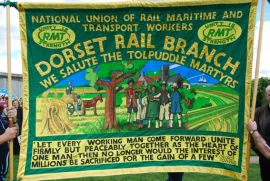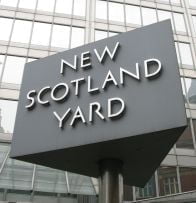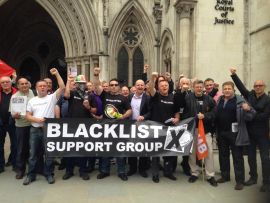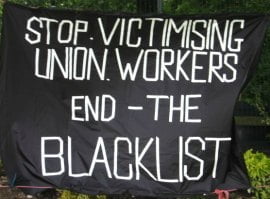Frank Cooper takes a detailed look at the scandal of blacklisting, in which thousands of workers and trade unionists have been left with a permanent scar on their employment record, due to a clandestine campaign of the bosses with the help of the capitalist state. But workers are now fighting back against the blacklisters.
In March 2009, the Information Commissioner’s Office (a public body set up to investigate the misuse of individuals’ private information) exposed the existence of a ‘blacklist’ containing the names of 3,213 individuals, largely construction workers. The “Consulting Association”, as it was known, had operated from 1993, systematically compiling a database of workers’ personal details as well as substantive entries regarding their conduct, political affiliations and trade union activities.
For up to 16 years the Consulting Association served a total of 43 subscriber companies, including giants of the industry such as Sir Robert McAlpine Ltd, Carillion and Balfour Beatty. These companies paid tens of thousands of pounds in fees to check the details of workers applying for work on their sites and systematically denied work to anyone they considered a “troublemaker”. The blacklist was able to maintain an office, a full-time staff, and even a company car for its ‘director’, Ian Kerr.
More often than not, a “troublemaker” was in fact someone who raised health and safety concerns or took part in an industrial dispute. This was trade union victimisation on a mass-scale, but it was hardly unprecedented. The practice of blacklisting in the UK has a long and illustrious history, stretching back as far as the 1870s (if not farther). Nor was it restricted to private employers – as more recent revelations have shown, the British state actively aided and abetted the Consulting Association and its predecessors’ operations, not only by wilfully failing to prevent this abusive practice, but also by the provision of information and strategic guidance.
A study of the scourge of blacklisting in Britain, and the heroic struggle against it, is valuable for workers’ movements everywhere because it exposes not only the injustice and exploitation present in all countries, but also the means by which it can one day be defeated – the unified action of workers and youth to change society for the better.
A proud British tradition
The victimisation of trade unionists has existed for as long as workers have grouped together in defence of their interests – it is a constant and necessary feature of the class struggle in any capitalist society. As the working class has grown and developed itself politically, so too have the methods of exploitation and repression used by the ruling class. In this context, the professional ‘blacklist’, operating in secret, represents neither accident nor aberration, but rather the highest expression of the war waged by capital against labour.
 In Britain, the bosses’ struggle against their own workers first took the form of the Combination Acts, which imposed criminal sanctions (including penal transportation as in the case of the Tolpuddle Martyrs) on any group of workers attempting to negotiate collectively for better pay and conditions. This – the crudest form of repression available – brutally supressed any attempt by workers to organise, but still it failed to stem the rising tide of trade unionism in 19th century Britain. It was to the modern blacklist what a flint hand axe is to a scalpel. A more subtle approach was required.
In Britain, the bosses’ struggle against their own workers first took the form of the Combination Acts, which imposed criminal sanctions (including penal transportation as in the case of the Tolpuddle Martyrs) on any group of workers attempting to negotiate collectively for better pay and conditions. This – the crudest form of repression available – brutally supressed any attempt by workers to organise, but still it failed to stem the rising tide of trade unionism in 19th century Britain. It was to the modern blacklist what a flint hand axe is to a scalpel. A more subtle approach was required.
After the legalisation of trade unions in 1871, organised labour was subject to a new wave of attacks, not only by employers but also the venerable ‘Common Law’; that famed guarantor of English freedom. No longer able to smash trade unions as a whole, employers instead focused their attacks on the individual trade unionists who dared to raise objections to low pay, long hours and poor conditions. By the use of euphemistically named “character notes”, employers would keep tabs on the activities of their workers and prevent those who were considered “troublemakers” (i.e. trade unionists) from obtaining work. The blacklist was born. When affected workers appealed to the courts for assistance they were turned away – as he was only seeking to “protect his own self-interest”, the blacklisting employer was apparently acting in accordance with the law.
In 1919, the first national blacklist was founded under the name of “National Propaganda” by a group of industrialists and Sir Reginald Hall – a Conservative MP and director of Naval Intelligence during the First World War. The increasing militancy in the working class resulting from the death and privation of the war, along with the victory of the Bolsheviks in 1917, had created an unbearable situation for the British ruling class. Accordingly, a powerful weapon was needed to counter the growing power and confidence of the workers.
In addition to the production of extensive material ‘educating’ the masses as to the evils of Bolshevism, National Propaganda, which subsequently became known as the “Economic League”, compiled an immense blacklist, monitoring workers in over 600 companies, including such famous names as Barclays Bank, British Telecom and Ford Motor Company.
 1972 saw a dramatic rise in strikes and pickets in the construction industry, with the most famous being the ‘Shrewsbury pickets’ in September of that year. Three of the picketers were jailed in 1973 as part of a government crackdown.The Economic League had particular success in the British construction industry, which, due to its heavily casualised and scattered nature, proved to be the most fertile ground for the practice of blacklisting – so much so that a distinct entity within the League by the name of the “Services Group” was set up in the early 1970s to cater solely to the needs of its construction clients. The timing of this expansion was not accidental. The beginning of the 1970s had seen an explosion in strike activity, particularly in the construction industry, and employers (along with the British state) were increasingly concerned by the perceived influence of “small groups of extremists” who were leading the flock astray.
1972 saw a dramatic rise in strikes and pickets in the construction industry, with the most famous being the ‘Shrewsbury pickets’ in September of that year. Three of the picketers were jailed in 1973 as part of a government crackdown.The Economic League had particular success in the British construction industry, which, due to its heavily casualised and scattered nature, proved to be the most fertile ground for the practice of blacklisting – so much so that a distinct entity within the League by the name of the “Services Group” was set up in the early 1970s to cater solely to the needs of its construction clients. The timing of this expansion was not accidental. The beginning of the 1970s had seen an explosion in strike activity, particularly in the construction industry, and employers (along with the British state) were increasingly concerned by the perceived influence of “small groups of extremists” who were leading the flock astray.
The activities of the Economic League and the Services Group continued until both were wound up in 1993, following their exposure in the British media several years prior. By this time the League had compiled files on 22,000 people, including the future Prime Minister, Gordon Brown. At its peak the League’s records department was receiving 17,000 calls per month. It was a vast enterprise, an industry unto itself and, moreover, it was extremely lucrative – in 1986 the League had an income from company subscriptions of around £1 million.
Shortly after the Service Group was wound up, Ian Kerr, one of the coordinators of the Services Group, was instructed to salvage as many of the files relating to construction workers as he could, with the purpose of establishing a new blacklist for the construction industry. Kerr diligently applied himself to his task, and that same year The Consulting Association was set up with the help of a £10,000 loan from Sir Robert McAlpine Ltd. Construction companies then ‘subscribed’ to it for a fee. The member companies elected an Executive Committee (later renamed the Finance Committee) and a chairman from several of the largest companies. This was no ramshackle operation – the blacklisters meant business.
The Consulting Association blacklist operated as follows: A subscriber would fax a list of job applicants’ names to Kerr at the Consulting Association office in Worcestershire. Kerr would then check the names against his own database. If any comment had previously been entered under any of the names on the list (“Leading activist in strike” or, “Do not employ” for example), Kerr would confirm that something had come up. Following this he would pass on the information held on the individuals’ files to one of his contacts at the company, more often than not a high-ranking HR officer. The companies’ lower-ranking employees were kept in the dark about the blacklist’s operations in order to maintain its secrecy.
Once the company had received the relevant information from Kerr it would decide on a course of action. Often the result was that the worker in question was refused work on a particular site or project without reason or was told, “We’ve no work for you today”. The effect this had on blacklisted workers’ lives was devastating and the pattern was repeated across the country on an ever increasing scale.
 Dave Smith’s blacklist file was 36 pages long and contained information on members of his family as well as detailed entries on his jobs and trade union activities.In their excellent book, “Blacklisted: The Secret War Between Big Business And Union Activists”, Dave Smith, a blacklisted engineer and National Secretary of the Blacklist Support Group (BSG), and Phil Chamberlain, a journalist who has written extensively on the Consulting Association blacklist, relate that invoices recovered in the ICO raid showed that in the period between July and September 2008 alone, Sir Robert McAlpine Ltd had been charged £12,839.20 in fees for checking names on the blacklist. At that time, companies were charged £2.20 for each name checked, which means that in three months just one of the 43 subscriber companies had checked the names of 5,836 individual workers. Between October 1999 and April 2004 Carillion checked an estimated 14,724 names. The blacklist had become an integral part of the British construction industry at a time when a then New Labour government, along with the capitalist media, was preaching the end of the class struggle and the dawn of the “Third Way” between capitalism and socialism.
Dave Smith’s blacklist file was 36 pages long and contained information on members of his family as well as detailed entries on his jobs and trade union activities.In their excellent book, “Blacklisted: The Secret War Between Big Business And Union Activists”, Dave Smith, a blacklisted engineer and National Secretary of the Blacklist Support Group (BSG), and Phil Chamberlain, a journalist who has written extensively on the Consulting Association blacklist, relate that invoices recovered in the ICO raid showed that in the period between July and September 2008 alone, Sir Robert McAlpine Ltd had been charged £12,839.20 in fees for checking names on the blacklist. At that time, companies were charged £2.20 for each name checked, which means that in three months just one of the 43 subscriber companies had checked the names of 5,836 individual workers. Between October 1999 and April 2004 Carillion checked an estimated 14,724 names. The blacklist had become an integral part of the British construction industry at a time when a then New Labour government, along with the capitalist media, was preaching the end of the class struggle and the dawn of the “Third Way” between capitalism and socialism.
Kerr’s blacklist didn’t just target construction workers. A ‘greenlist’ of environmental protesters was also maintained so that companies could track the activities of individual activists and, where necessary, prevent them from joining construction firms, presumably to protect them from internal ‘sabotage’. In addition to this, Kerr would regularly attend trade union and political meetings, noting the identity of speakers and the content of their speeches. He also kept abreast of the left-wing press, regularly reading the Militant, the Socialist Worker, the Morning Star, etc. If a construction worker was named in or had written an article for one of these publications, he would be added to the blacklist. Workers were also considered “troublemakers” if they were involved in anti-fascist or anti-apartheid campaigns. Evidently, any sort of political conscience was seen as potentially dangerous, a prejudice shared by the British authorities, especially the police.
The role of the state
In the last analysis, the state in any society can be reduced to “special bodies of armed men” (to use Lenin’s phrase) in defence of existing property relations. In the history of blacklisting we can see how this general principle operates in practice. Whether it be through the forcible liquidation of workers’ organisations, the tipping of the scales of justice by a pliant judiciary, or the collusion of police spies with a clandestine blacklist, the role of the state has consistently been that of the defender of property and profit.
 Undercover police officers are suspected of sharing information with the Consulting Association blacklist.A number of revelations have come to light which show beyond question that the British police were actively cooperating with the blacklisters right up until the Consulting Association was shut down in 2009. Thanks to a document leaked last year, we now know that on 6th November 2008, only a few months before the blacklist was seized, a Detective Chief Inspector in the “National Extremism Tactical Co-ordination Unit (NECTU)” met with members of the Consulting Association at a hotel in Oxfordshire. According to the minutes, taken by Kerr, the purpose of the meeting was to brief companies on the tactics being used to combat “domestic extremism” and to “liaise with industry”. What reason would an undercover police unit such as NECTU have for discussing tactics with representatives from six of the biggest construction firms in the UK? The answer is obvious – the “extremists” envisaged at this meeting were the very workers being blacklisted by the Consulting Association. In other words, the police didn’t just know about blacklisting – they even wanted to share notes.
Undercover police officers are suspected of sharing information with the Consulting Association blacklist.A number of revelations have come to light which show beyond question that the British police were actively cooperating with the blacklisters right up until the Consulting Association was shut down in 2009. Thanks to a document leaked last year, we now know that on 6th November 2008, only a few months before the blacklist was seized, a Detective Chief Inspector in the “National Extremism Tactical Co-ordination Unit (NECTU)” met with members of the Consulting Association at a hotel in Oxfordshire. According to the minutes, taken by Kerr, the purpose of the meeting was to brief companies on the tactics being used to combat “domestic extremism” and to “liaise with industry”. What reason would an undercover police unit such as NECTU have for discussing tactics with representatives from six of the biggest construction firms in the UK? The answer is obvious – the “extremists” envisaged at this meeting were the very workers being blacklisted by the Consulting Association. In other words, the police didn’t just know about blacklisting – they even wanted to share notes.
Even more damning evidence has come from a former undercover police officer turned whistle-blower, Peter Francis. As part of the Metropolitan Police’s “Special Demonstration Squad” in the 1990s, Francis was tasked with infiltrating anti-racist groups and spying on their members. He is adamant that some of the entries contained in the Consulting Association’s blacklist files have come directly from information he supplied to his superiors. David Clancy, a former police officer and the man who led the ICO investigation into the Consulting Association also confirmed in court that “there is information on the Consulting Association files that I believe could only be supplied by the police or the security services”.
Unsurprisingly, the UK authorities’ paranoid monitoring of political activists went even further than that of the Consulting Association. In a statement read out at a meeting of the BSG in March this year, Francis expressed his wish to “unreservedly apologise to all the union members I personally spied upon and reported back on whilst deployed undercover in the SDS, including those not only engaged working in the construction industry but also those in the National Union of Students (NUS), National Union of Teachers (NUT), Communication Workers Union (CWU), UNISON [the largest public sector union in the UK] and the Fire Brigades Union (FBU).” In other words, the 3,213 workers blacklisted by the Consulting Association are just the tip of the iceberg. In a campaign of espionage conducted against its own people, the British state has kept a close eye on all workers and youth who dare to organise against the rule of capital.
Ignored by the Establishment
The systematic surveillance of political and trade union activists undermines the very foundation of a democratic society. The delivery of those same activists into the hands of a secret and malicious blacklist is an affront to humanity itself. It is the essence of totalitarianism disguised in the so-called cradle of parliamentary democracy. And yet the response of successive governments and the capitalist media has been at best lukewarm and at worst completely indifferent.
 There was no shortage of coverage when the scandal over phone hacking by journalists erupted in 2011.With the exception of the coverage in the Guardian and a BBC documentary on blacklisting released in 2013 (four years after the blacklist was exposed), the mainstream media outlets in Britain have treated the struggle of blacklisted workers for justice with cold disdain, rarely bothering to give the issue the oxygen of publicity. It is worth noting that when a similar number of individuals (including many celebrities) had their mobile phones hacked by journalists from Rupert Murdoch’s News of the World, the British press erupted into an orgy of mutual recriminations. Eager to appear to be defending the right to privacy, the government was quick to call an inquiry with full investigative powers to look into the issue. After months of evidence and cross-examination – all broadcast live on television – a lengthy report was produced, recommending a new form of press regulation to prevent such abuses in future, which David Cameron, in his infinite wisdom, dismissed as too great a danger to the sacred freedom of the press. This is what £5.4 million buys you in austerity Britain.
There was no shortage of coverage when the scandal over phone hacking by journalists erupted in 2011.With the exception of the coverage in the Guardian and a BBC documentary on blacklisting released in 2013 (four years after the blacklist was exposed), the mainstream media outlets in Britain have treated the struggle of blacklisted workers for justice with cold disdain, rarely bothering to give the issue the oxygen of publicity. It is worth noting that when a similar number of individuals (including many celebrities) had their mobile phones hacked by journalists from Rupert Murdoch’s News of the World, the British press erupted into an orgy of mutual recriminations. Eager to appear to be defending the right to privacy, the government was quick to call an inquiry with full investigative powers to look into the issue. After months of evidence and cross-examination – all broadcast live on television – a lengthy report was produced, recommending a new form of press regulation to prevent such abuses in future, which David Cameron, in his infinite wisdom, dismissed as too great a danger to the sacred freedom of the press. This is what £5.4 million buys you in austerity Britain.
Six years on, where is the inquiry into blacklisting? The laudable efforts of the Scottish Affairs Committee (SAC) have brought more evidence to light than would otherwise have been available; but this is a national scandal stretching back decades – it requires a full investigation at all levels. Even without this inquiry, the evidence, as considered by the SAC, is damning. The Economic League and its successor, the Consulting Association, not only infringed the privacy of thousands of workers by sharing their personal information, in many cases they spread malicious (and often false) statements about their character and, crucially, in almost all cases they deliberately prevented them from selling their (often highly skilled) labour in order to make a living. In the words of Dave Smith, “These firms took the food off of our kids’ tables”. Blacklisting has been rightly described legal academic, Prof Keith Ewing, as “the worst human rights abuse in relation to workers’ in the UK in 50 years” and yet this is not considered as worthy of public scrutiny.
The steps taken to punish the blacklisters and prevent blacklisting in future are staggering in their inadequacy. Ian Kerr, the man who was personally involved in the blacklisting of workers since the 1970s, was fined the princely sum of £5,000 for a breach of the Data Protection Act. This fine was in fact paid by his benefactors at Sir Robert McAlpine Ltd. To date, with the (questionable) exception of Kerr who has since died, not one of the companies and individuals who used the blacklist has been brought to justice.
In 2010, the then Labour government passed legislation that finally made blacklisting illegal, but failed to make it a criminal offence. Later, the Tory-Liberal coalition did not see fit to correct this glaring error. In any event, blacklisting is by nature so secretive that nothing short of a raid by a public agency was able to provide sufficient proof for legal action; so the idea that individual blacklisted workers are going to be in a position to take multi-national construction firms to court on the strength of the vaguely worded 2010 Regulations cannot be taken seriously.
There is no compelling reason to believe that the practice of blacklisting has ceased completely. The companies which helped to found the Consulting Association did so in secret immediately following the collapse of the previous blacklist. Kerr admitted before the SAC that shortly after the ICO raid in 2009 he burnt up to 90% of the records held by the Consulting Association on the instructions of Sir Robert McAlpine Ltd. This shows not only a sickening contempt for the workers whose livelihoods were destroyed by this blacklist, but also that the blacklisters would be prepared to do it again and have no reservations or scruples when it comes to protecting their profits, whatever the human cost.
 Further, there is evidence to suggest that the practice of sacking workers for raising health and safety concerns continues to this day on major construction projects such as Crossrail (the largest in Europe). At the same time, construction workers continue to perish as a result of insufficient health and safety protection. This is capitalism in the 21st century – at a time when in the UK “an average of one person a week was dying because of an accident” in construction (as reported by Smith & Chamberlain), contractors who were making millions in profits were spending money which could have been spent on preventing those accidents on a clandestine operation designed to silence workers’ legitimate health and safety concerns – all done with the cooperation of the state. To paraphrase Hamlet, “Something is rotten in the state of the UK.”
Further, there is evidence to suggest that the practice of sacking workers for raising health and safety concerns continues to this day on major construction projects such as Crossrail (the largest in Europe). At the same time, construction workers continue to perish as a result of insufficient health and safety protection. This is capitalism in the 21st century – at a time when in the UK “an average of one person a week was dying because of an accident” in construction (as reported by Smith & Chamberlain), contractors who were making millions in profits were spending money which could have been spent on preventing those accidents on a clandestine operation designed to silence workers’ legitimate health and safety concerns – all done with the cooperation of the state. To paraphrase Hamlet, “Something is rotten in the state of the UK.”
The fight continues
Despite the best efforts of the blacklisters and their parliamentary stooges to bury this scandal, the fight against blacklisting has gone from strength to strength. The Blacklist Support Group, a group of blacklisted workers set up after the ICO raid, has tirelessly campaigned for an inquiry into blacklisting, for compensation to be paid to those who were deprived of their livelihoods, and for an end to blacklisting in the construction industry and everywhere else under the slogan: “Own up! Clean up! Pay up!”
In the face of the firms’ thuggish bullying tactics, along with the indifference of the government – it should be noted that Sir Robert McAlpine is a long standing Tory party donor, giving them £77,500 in 2009 – the BSG has enlisted the support of politicians such as Labour MP, John McDonnell, sympathetic lawyers and a whole raft of activists and campaigners. They have staged protests and meetings all over the country and brought several legal claims against the companies responsible, despite the immense obstacles placed in their way by the British legal system.
 Blacklisted workers protesting outside the Royal Courts of Justice in London.Following this inspiring lead, the TUC (a federation of trade unions in the UK) and in particular the trade unions Unite, the GMB and UCATT, have thrown their considerable weight behind the campaign. The companies are currently faced with a juggernaut of a court case which, if successful, could cost them millions in damages and legal costs.
Blacklisted workers protesting outside the Royal Courts of Justice in London.Following this inspiring lead, the TUC (a federation of trade unions in the UK) and in particular the trade unions Unite, the GMB and UCATT, have thrown their considerable weight behind the campaign. The companies are currently faced with a juggernaut of a court case which, if successful, could cost them millions in damages and legal costs.
In addition to the ongoing legal action, both the trade unions and the Labour Party have taken up the demand for a full public inquiry into blacklisting. This step forward was sadly cut across by the Tory victory in May’s General Election; but the BSG has recently submitted a formal request for the involvement of the police in blacklisting to be included as a term of reference in the upcoming inquiry into undercover policing.
Contrasting the current situation with that of 1993, when ‘business as usual’ was re-established in a matter of months, it is clear that a fundamental change has taken place. At a time of economic boom, only a few years after the workers’ suffered a decisive defeat in the Miners’ Strike of 1984-85, the shocking revelations about the Economic League and Services Group were like water off a duck’s back to the blacklisters and the Establishment. Not so today, when every attempt to stabilise the crisis-ridden situation on the economic plane greatly undermines the stability and support for the usual pillars of bourgeois society: parliament, the police, the press, etc.
What is needed now is to link the struggle against blacklisting to the struggle for a new, better society. The Marxists in Britain give full support to the blacklisted workers’ demands and wish them every success in their fight for compensation; but no level of damages can bring back the workers who lost their lives on dangerous sites or took their own in desperation.
Only in an industry run democratically by workers, planned for the benefit of society as a whole, can blacklisting finally become a thing of the past. The bosses’ state will not lift a finger against its big business backers. Only the workers themselves can force the blacklisters to reveal their dirty secrets and bring this disgusting practice, along with the rotten system which gave birth to it, to an end.
Ultimately, the struggle for truth and justice against the blacklisters is inseparable from the struggle for emancipation of the oppressed and exploited masses everywhere – in short, the struggle for socialism.
- Justice for blacklisted workers! For a full ‘Leveson-style’ inquiry into blacklisting in the UK! Any blacklisting firms who refuse to co-operate should be ordered to allow inspection of their records by a delegation from the trade unions.
- Blacklist the blacklisters! Blacklisting firms should be excluded from tendering for building contracts in our councils; our hospitals; our schools and universities. Only when their profits are at risk will the blacklisters own up, clean up and pay up!
- For socialism! The blacklisting of trade unionists and politically active workers is an integral part not only of the UK construction industry but also of British capitalism as a whole. We are for a nationalised construction industry as part of a democratically planned economy which builds for the needs of the many and not the profits of the few!






